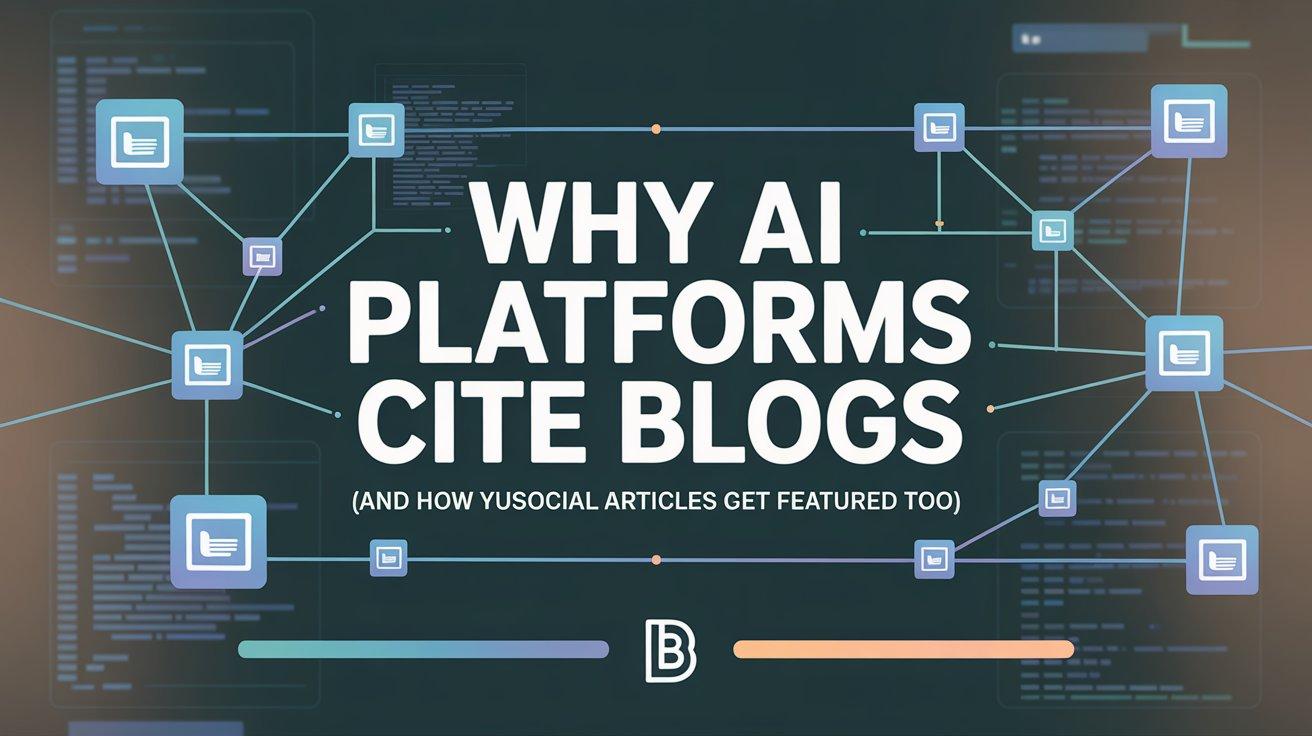Why AI Platforms Cite Blogs (and How YuSocial Articles Get Featured Too)

Artificial intelligence is quickly becoming the new gateway to information. Tools like ChatGPT, Perplexity, and Google’s Search Generative Experience (SGE) are reshaping how people get answers online.
But here’s the catch: not every type of content gets cited by these AI platforms.
If you’ve been wondering why your Facebook or Instagram posts don’t show up in AI answers — while some blogs and websites do — this article breaks it down.
What AI Platforms Actually Cite
AI-powered systems need sources they can verify, index, and link back to. That’s why they tend to pull from:
-
Blog posts and articles — structured, long-form content optimized for search.
-
News websites and media outlets — credible, regularly updated sources.
-
Research papers and whitepapers — authoritative and data-backed.
What They Rarely Cite
On the flip side, certain types of content almost never make it into AI responses:
-
Facebook and Instagram posts (not indexable, often behind login walls)
-
TikTok and short videos (not text-based, unless transcripts are available)
-
Ephemeral stories or disappearing content
Why? Because these platforms aren’t built for long-term visibility. AI platforms can’t rely on content that’s hidden, temporary, or difficult to verify.
Why Blogs Are the King of Citations
The secret lies in three simple factors:
-
Search Visibility – Blogs are indexed by Google and optimized for keywords.
-
Structured Content – Headings, FAQs, and organized answers make them easy for AI to parse.
-
Permanent Presence – Unlike fleeting posts, blog articles stay online, making them evergreen sources.
How YuSocial Gives You an Edge
Here’s where YuSocial blogging changes the game:
-
Indexed by Google – Articles published on YuSocial get their own SEO-friendly permalink that’s crawlable and citable.
-
Citable in AI Platforms – Because YuSocial blogs behave like standalone articles, they can appear as sources in ChatGPT, Perplexity, or Google SGE answers.
-
Boosted by Community Engagement – Tips, likes, and discussions on YuSocial amplify the authority of your post, signaling to search engines (and AI) that your content is valuable.
-
All-in-One Hub – Unlike other platforms, YuSocial combines blogging + community + monetization, meaning your citable content also drives audience growth and income.
In other words: publishing on YuSocial doesn’t just make you visible on the platform — it positions you as a source AI platforms can trust.
Frequently Asked Questions (FAQs)
Q1: Do AI platforms like ChatGPT cite Facebook or Instagram posts?
No. Most social media posts aren’t indexed by Google and therefore aren’t accessible for AI citations.
Q2: What type of content is most likely to be cited by AI?
Blog posts, news articles, whitepapers, and research reports — because they are structured, authoritative, and crawlable by Google.
Q3: Why are YuSocial articles citable?
YuSocial blogs get unique, SEO-friendly URLs that are indexed by Google. That makes them visible to AI platforms that pull information from the web.
Q4: How can I make my YuSocial article more likely to be cited?
Write long-form, keyword-rich content, include FAQs, and provide clear answers to “what,” “why,” and “how” questions.
Q5: Should I still post on traditional social media?
Yes, but use it mainly to drive people to your YuSocial articles — the articles are what get indexed and cited, not the social posts themselves.
Final Thoughts
AI platforms are quickly becoming the new search engines. The question is: will your brand be part of the answers people see?
If you’re still posting only on traditional social media, you’re missing out. To get cited, you need structured, search-friendly, evergreen content.
That’s exactly what YuSocial’s blogging feature gives you. Publish your expertise today, and position yourself as the voice AI platforms can’t ignore.
To get started, subscribe to any of YuSocial's PRO packages to access the blogging feature.
- Real Estate
- How Tos
- History and Facts
- Business
- Exclusive Interviews
- Art
- Causes
- Crafts
- Dance
- Drinks
- Film
- Fitness
- Food
- Games
- Gardening
- Health
- Home
- Literature
- Music
- Networking
- Other
- Party
- Religion
- Shopping
- Sports
- Theater
- Wellness



